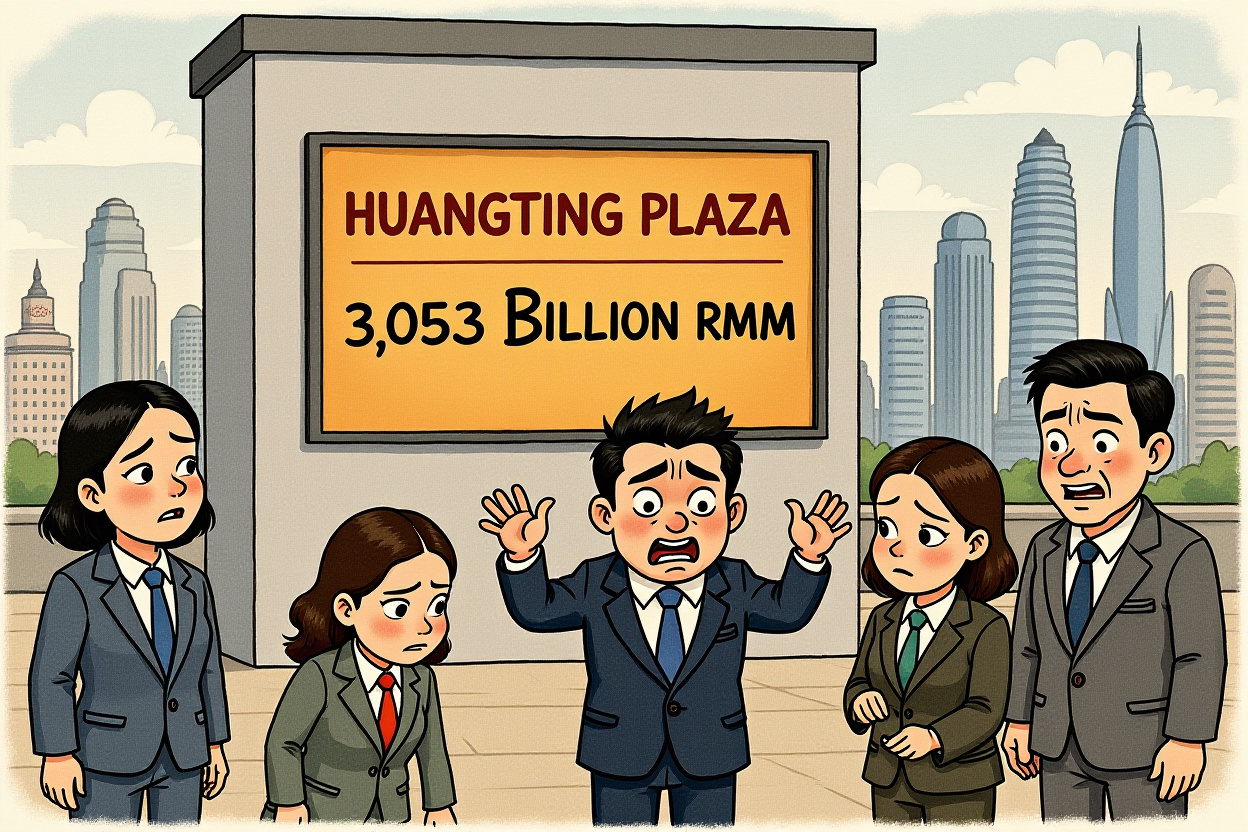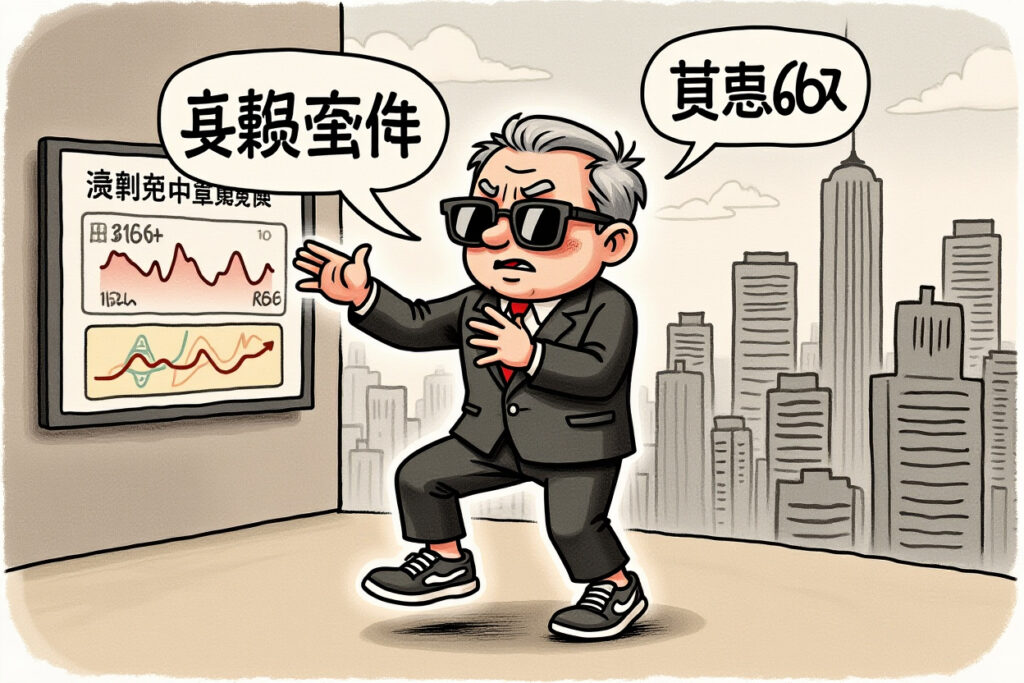The Auction That Could Change Everything
Huangting International, a Shenzhen-based listed company, finds itself at a critical crossroads. Its most valuable asset, the iconic Huangting Plaza, has been placed on a judicial auction platform with a starting bid of RMB 3.053 billion—approximately 30% below its assessed market value. This auction represents more than just a property sale; it could determine whether Huangting International remains a publicly traded company or faces forced delisting from the Shenzhen Stock Exchange.
The company has explicitly stated that if the auction succeeds, it would constitute a major asset restructuring and likely trigger financial-based compulsory delisting risk warnings. Given that Huangting Plaza represents 71.57% of the company’s total assets and generates over 56% of its annual revenue, the stakes couldn’t be higher for Huangting International and its investors.
Current Auction Status
As of the most recent updates, the auction has attracted no bidders and received no offers. This temporary reprieve gives Huangting International some breathing room, but the underlying financial pressures remain. The property itself comes with additional liabilities—approximately RMB 16.32 million in unpaid management fees and RMB 7.4 million in outstanding utility bills that the successful bidder would need to assume.
Real estate market analysts note that while the property occupies prime Shenzhen CBD real estate, the current market conditions have created a buyer’s market with numerous distressed properties available. Without significant price advantages or pristine asset conditions, even premium properties can struggle to attract bidders in judicial auctions.
From Regional Developer to National Attention
Huangting International’s journey to this precarious position began decades ago. The company’s chairman, Zheng Kanghao (郑康豪), represents a classic story of regional business expansion. Hailing from Chaoyang, Guangdong, Zheng belongs to what local media describes as the “property second generation”—children of successful real estate developers who inherited and expanded family businesses.
Zheng’s father, Zheng Shijin, established Henghao Real Estate in 1997, which would eventually become Huangting International. The company developed several residential projects in Shenzhen before making its major commercial breakthrough with Huangting Plaza.
In 2010, Zheng Kanghao acquired controlling interest in the A-share listed company then known as “Shenzhen International Enterprise Co., Ltd.” (深国商) and gained control of the Crystal Island International Shopping Center project. This property reopened as Huangting Plaza in 2013, marking Huangting International’s entry into high-end shopping center development and operation.
The Debt That Started It All
The current crisis traces back to a financing decision made nearly a decade ago. In 2016, Huangting International’s subsidiary Rongfa Investment secured a RMB 3 billion trust loan from CITIC Trust, using Huangting Plaza as collateral. The loan, originally scheduled for repayment between 2016 and 2021, came with additional guarantees: Huangting International pledged its 60% stake in Rongfa Investment, while its subsidiary POWERLAND HOLDINGS LIMITED pledged its 40% stake. Chairman Zheng Kanghao personally provided连带责任保证担保 (joint liability guarantee).
This financing coincided with Huangting International’s aggressive expansion into financial services. The company established Huangting Fund Management and announced plans to create a RMB 1 billion specialized merger and acquisition fund focused on commercial real estate integration. Subsequently, Huangting Fund Management acquired significant stakes in Shenzhen Tongxin Investment Fund Share Company and Shenzhen Tongxin Small Loan Company.
When Expansion Meets Market Reality
Industry analysts suggest that while external market conditions contributed to Huangting International’s current predicament, internal strategic decisions played a more significant role. “Some problems appear unexpected, but upon deeper examination, we must trace their origins to internal corporate issues,” noted one consulting firm analyst. “During market upswings, if companies expand too aggressively without adequately anticipating potential risks or preparing countermeasures, they may face liquidity pressures when markets adjust.”
The company’s financial services expansion required substantial capital investment just as China’s regulatory environment for trust loans and shadow banking activities began tightening. When the CITIC Trust loan matured, Rongfa Investment couldn’t fulfill its repayment obligations, leading to legal action.
The Legal Proceedings and Management Changes
CITIC Trust initiated proceedings in Shenzhen Intermediate People’s Court, which eventually led to the current auction. In an attempt to manage the situation, the court arranged for monthly deductions from Rongfa Investment’s accounts—partially repaying CITIC Trust while ensuring Huangting Plaza’s continued operation.
However, a significant development occurred in July 2024 when the court approved CITIC Trust’s transfer of its creditor rights to Guangyao Xialan (Shenzhen) Investment Co., Ltd. This transfer made Guangyao Xialan the new creditor for Rongfa Investment’s debt.
Amid these financial struggles, Huangting International experienced management changes. In June 2024, the company announced that Liu Haibo, director and executive president, had resigned from his positions but would remain as a commercial advisor.
Potential Solutions Still in Play
Huangting International continues to negotiate with creditors toward a comprehensive debt resolution plan. The company has stated that if both parties reach an agreement, the court might cancel the judicial auction. Such an outcome would positively impact the company’s financial status and operations.
The company emphasizes its commitment to “strictly fulfilling information disclosure obligations in accordance with relevant laws, regulations, and normative documents” throughout this process.
Transformation Efforts: From Real Estate to Technology
While addressing its debt challenges, Huangting International has pursued strategic transformation into technology sectors. The company has positioned itself for what it describes as a 3-5 year strategic goal: “becoming a first-class enterprise with core competitiveness in the energy electronics field.”
In January 2023, Huangting International and its controlled subsidiary Dexing Yifa Power Semiconductor signed investment cooperation agreements with Anhui Chaohu Economic Development Management Committee for a specialty advanced CLIP process power device packaging project. This project would have represented Huangting International’s entry into advanced semiconductor packaging technology.
However, the company announced in August 2024 that the project had seen delayed progress with no substantive developments, leading to termination of the cooperation agreements.
Other Technology Initiatives
Beyond the failed semiconductor project, Huangting International has pursued other technology partnerships:
– In March 2024, the company announced a strategic cooperation with Shenzhen Xinmao Microelectronics to establish “mutual strategic customer” innovation cooperation模式 (model), focusing on power chip agency sales and high-power gallium nitride device joint development
– In August 2024, Huangting International signed a capital increase and share expansion agreement with Shenzhen Zunguang Solid-State Battery Co., Ltd., targeting energy storage and new materials sectors
The company stated these initiatives would “further improve the new industrial ecosystem built around the ‘power semiconductor+’ investment and development logic” and potentially become new profit growth points.
Current Business Reality and Future Prospects
Despite its technology aspirations, Huangting International’s financial results tell a different story. According to the company’s 2025 interim report:
– Total assets: RMB 7.93 billion
– First-half revenue: RMB 290 million, down 18.48% year-over-year
– Revenue composition: Commercial operations (50.16%), property management services (32.57%), investment property sales (8.93%), and power semiconductor business (8.33%)
Company management acknowledges that commercial management business remains its core operation and the foundation for strategic transformation. The modest contribution from semiconductor operations highlights the challenge of transitioning from real estate to technology.
Market Perspective on Huangting International’s Situation
Financial analysts monitoring the situation note that Huangting International’s case reflects broader challenges in China’s property sector, where highly leveraged companies face liquidity crises amid market adjustments. The company’s attempt to diversify into technology follows a pattern seen among other Chinese real estate developers seeking new growth avenues amid property market uncertainties.
The outcome of the Huangting Plaza auction—whether it proceeds or is canceled through successful debt negotiations—will significantly influence the company’s ability to continue its transformation efforts. If the auction succeeds, Huangting International would lose not just its primary revenue generator but also the collateral that could secure future financing for its technology initiatives.
Navigating an Uncertain Future
Huangting International stands at a critical juncture, facing simultaneous challenges of debt resolution, potential delisting, and business transformation. The company’s immediate future depends largely on whether it can negotiate a settlement with creditors that preserves its core asset while continuing to develop new business lines.
The commercial real estate market in China continues to face headwinds, particularly for retail properties that must adapt to changing consumer behaviors and e-commerce competition. Huangting Plaza, despite its prime location, operates in this challenging environment.
Meanwhile, the technology sectors Huangting International has targeted—semiconductors, power devices, and energy storage—represent promising growth areas but require significant expertise and capital investment that may prove challenging for a company with Huangting International’s financial constraints.
Investors and industry observers will closely watch several key developments: the outcome of the asset auction or potential settlement negotiations, the company’s ability to meet listing requirements if it retains Huangting Plaza, and the progress of its technology initiatives amid financial pressures.
For those tracking China’s corporate landscape, Huangting International’s story offers valuable lessons about strategic planning, risk management, and adaptation to market changes. The company’s fate will reveal much about whether traditional property developers can successfully transform into technology enterprises—a transition many are attempting but few have mastered.
As the situation develops, stakeholders should monitor official company announcements and regulatory filings for the latest information. Those considering investment in companies undergoing similar transformations should carefully assess both the potential of new business lines and the risks associated with legacy operations and financial structures.




